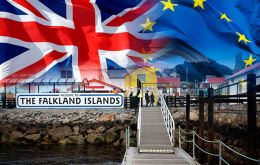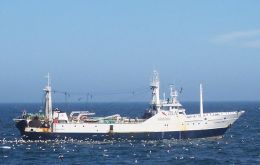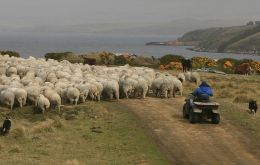MercoPress. South Atlantic News Agency
Tag: Falkland Islands Meat Company (FIMCo)
-
Tuesday, January 23rd 2024 - 10:51 UTC
Falklands: Sheep industry global downturn resurfaces debate on the abattoir

The decision by the Falkland Islands Executive Council, and approved by the Standing Finance Committee, to provide additional financing of £1 million to the Falkland Islands Meat Company (FIMCO), has not been without controversy.
-
Friday, July 12th 2019 - 23:56 UTC
Falkland Islands economy and Brexit…how tough will it be?

Last week Penguin News reported on the uncertainty surrounding Brexit causing a slump in meat sales from the Falkland Islands Meat Company and lower prices.
-
Friday, July 5th 2019 - 08:31 UTC
Falklands' farmers suffer Brexit uncertainty: lower prices and slower sales of meat

Uncertainty surrounding the possibility of a no-deal Brexit resulted in lower prices and slower sales of meat in the 2019 export season, Falkland Islands farmers were told this week.
-
Friday, March 22nd 2019 - 09:00 UTC
The Falkland Islands states its position: Preparing for Brexit

On 23 June 2016, the people of the UK and Gibraltar voted by a majority to leave the European Union (EU). In this article the Falkland Islands Government (FIG) sets out what work has taken place since the referendum to prepare the Falkland Islands for Brexit.
-
Friday, March 15th 2019 - 04:59 UTC
Falklands Brexit impact still uncertain as 29 March looms

The possible impact of Brexit on the Falklands is no nearer to gaining definition as UK MPs once again voted against a Brexit deal proposed by Theresa May, as well as voting against the possibility of leaving the European Union (EU) without any sort of deal.
-
Friday, July 6th 2018 - 08:43 UTC
Brexit and the Falkland Islands: Potentially catastrophic?

Brexit could be “potentially catastrophic,” for the Falklands according to a recent UK newspaper article. And by all accounts it could have a serious impact if heavy tariffs were applied to goods exported from the Islands into the EU. But just how bad could it be?
-
Friday, February 2nd 2018 - 20:00 UTC
Falklands Meat Company renovated including a new business manager

The Falkland Islands Meat Company (FIMCo) has announced the appointment of their new Business Improvement Manager. Michael Ledwith is to start this month on a new full-time contract, tasked with implementing change at the Sand Bay plant, “bringing peak performance through operational efficiency and productivity in the business,” according to information from FIMCo.
